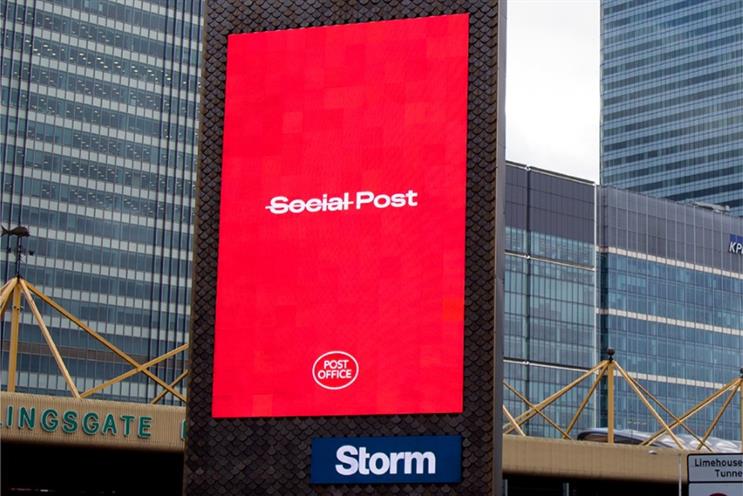
The Post Office has pounced on Monday’s Facebook outage to promote the reliability of "snail mail", with a tactical out-of-home ad from Ogilvy.
The ad, created by Ogilvy’s Ollie Jarrott, simply reads “Social post”, with the first word struck through.
It is currently running on Clear Channel sites in London but will be rolled out nationwide. Media is handled by Carat, which retained the Post Office’s business after a protracted pitch process that finished earlier this year.
Speaking to ±±¾©Èü³µpk10, Ogilvy executive creative director Jules Chalkley said the campaign came about thanks to an “always-on tactical brief” the agency has from the Post Office. “If anyone sees an opportunity, they can just take it,” he said.
The idea to respond to the Facebook outage was proposed by head of production Justin Cairns. A brief was put out to the whole agency at 8am yesterday, followed by an 11am meeting with Post Office clients, whom Chalkley called “really responsive”, and the work was live by 3pm.
The decision to run an out-of-home campaign was about “building on that real world thing and trying to make it as human as possible”, Chalkley said – in contrast to the reliance on computer systems that caused Facebook’s problems.
“While the world went into digital turmoil, Post Office did what it has always done: be the original social media network, connecting people day in day out, all over the country in a beautifully human way,” he added.
All Facebook’s platforms – Facebook, Instagram, WhatsApp and Messenger – were down for about six hours starting close to 5pm BST (noon EST) on Monday 4 October.
The reasons for the outage are complicated, but related to a problem with Facebook’s “backbone network”, which connects all the company’s data centres.
explaining what had happened, Facebook’s vice-president infrastructure, Santosh Janardhan, wrote: “The data traffic between all these computing facilities is managed by routers, which figure out where to send all the incoming and outgoing data.
“And in the extensive day-to-day work of maintaining this infrastructure, our engineers often need to take part of the backbone offline for maintenance — perhaps repairing a fibre line, adding more capacity, or updating the software on the router itself.
“This was the source of yesterday’s outage. During one of these routine maintenance jobs, a command was issued with the intention to assess the availability of global backbone capacity, which unintentionally took down all the connections in our backbone network, effectively disconnecting Facebook data centers globally.
“Our systems are designed to audit commands like these to prevent mistakes like this, but a bug in that audit tool prevented it from properly stopping the command.”
In on Monday, The Guardian’s UK technology editor, Alex Hern, suggested that the scale of the outage was the result of Facebook’s total reliance on its own systems.
“Facebook (accidentally, we assume) sent an update to a deep-level routing protocol on the internet that said, basically, ‘hey we don't have any servers any more’...” Hern wrote.
“Normally, this would be quite easy to fix. you just send another update saying ‘Oh, don't worry, we have servers, they're here’... but Facebook runs EVERYTHING through Facebook…
“So when its servers were booted off the internet, it also booted off… the ability to send that follow-up message… and the ability to log-in to the system that would send the follow-up message… and the ability to use the smartcard door lock on the front door to the building that contains the servers that control the system that sends the follow-up message…
“And the messaging service you use to contact the head of physical security to tell them they need to high-tail it to the data centre out east with a physical key to override the smartcard door lock on the front door…”
It has been a challenging week for Facebook, with whistleblower Frances Haugen yesterday testifying to the US Senate that the company was harming children and destabilising democracies by putting profit before other considerations.
, founder Mark Zuckerberg wrote: “The argument that we deliberately push content that makes people angry for profit is deeply illogical. We make money from ads, and advertisers consistently tell us they don't want their ads next to harmful or angry content. And I don't know any tech company that sets out to build products that make people angry or depressed. The moral, business and product incentives all point in the opposite direction.”
Sixty-three thousand users have so far responded to Zuckerberg’s post with the “Haha” laughing emoji reaction .



.jpg)
.jpeg)
